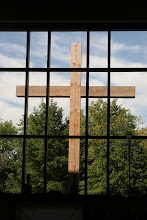For now we see in a mirror, dimly, but then we will see face to face. Now I know only in part, then I will know fully, even as I have been fully known. (1 Corinthians 13:12)
I recently had a conversation with a friend following a presentation by a Martin Luther scholar. The discussion centered on the subjects of grace and faith. One of the things we talked about was doubt, and how doubt relates to our faith. “So, we’re just supposed to have blind faith?” my friend asked, “Is that what God expects?”
There is so much about our faith of which we cannot be absolutely sure, and so in some things we must have blind faith. We must trust God wholly and completely in all that we do and in all that we are. But I also believe that doubts and questions are an integral part of our faith. We can’t know the mind of God.
The NRSV translation of 1 Cor. 13:12 is positively poetic. “For now we see in a mirror dimly.” Now we can’t see clearly what God has in store for us. The Greek word that is translated “dimly,” is actually “in a riddle.” Now we can only see in a riddle, but then, the riddle will be solved for us, we will know everything.
In John Irving’s wonderful book A Prayer for Owen Meany, the young narrator John Wheelwright compares the pastors of the two churches in his small Canadian town. One believed absolutely, and was “blind to doubt or worry in any form.” What made the other “infinitely more attractive was that he was full of doubt; he expressed our doubts in the most eloquent and sympathetic ways…” The gift of having faith, he said, was that it was necessary to believe in God without any great or even remotely reassuring evidence that we don’t inhabit a godless universe. I agree.
Dear God, Help our unbelief. Help us to know that, in wondrous time when we will see you face to face, all things will be perfectly clear. Amen.
Monday, October 19, 2009
Subscribe to:
Comments (Atom)

